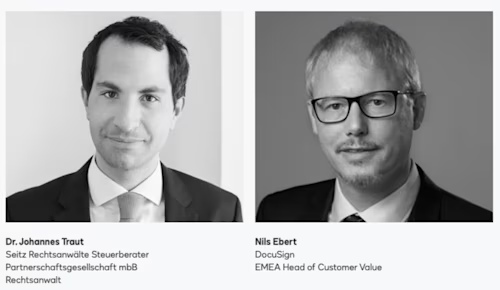
Digital. Rechtssicher. Docusign eSignature
Verpassen Sie nicht unseren Docusign Digital Day am 21. Oktober ab 10:00 Uhr.
- In der Cloud entwickelt, auf Vertrauen aufgebaut und auf Sicherheit ausgelegt
- Unsere Experten beim Docusign Digital Day
- Dr. Johannes Traut
- Nils Ebert
- 10:00 - 10:45 Uhr - Elektronische Signatur – Vertragsprozesse auf der Überholspur: Senden, signieren und verwalten Sie Ihre Verträge elektronisch überall und jederzeit.
- 11:00 - 11:45 Uhr - Rechtsgültigkeit und Rechtsverbindlichkeit von elektronischen Signaturen: Wie rechtssicher ist die elektronische Signatur?
- 13:00 - 13:45 Uhr - Docusign mit Microsoft oder Salesforce: Senden Sie Vereinbarungen und Genehmigungen direkt aus Ihren Geschäftsanwendungen.
- 14:00 - 14:45 Uhr - Mehrwert statt Papierberge produzieren: eSignature in der verarbeiteten Industrie: Verbesserte Wertschöpfung durch Docusign eSignature und der Agreement Cloud.
Inhaltsverzeichnis
- In der Cloud entwickelt, auf Vertrauen aufgebaut und auf Sicherheit ausgelegt
- Unsere Experten beim Docusign Digital Day
- Dr. Johannes Traut
- Nils Ebert
- 10:00 - 10:45 Uhr - Elektronische Signatur – Vertragsprozesse auf der Überholspur: Senden, signieren und verwalten Sie Ihre Verträge elektronisch überall und jederzeit.
- 11:00 - 11:45 Uhr - Rechtsgültigkeit und Rechtsverbindlichkeit von elektronischen Signaturen: Wie rechtssicher ist die elektronische Signatur?
- 13:00 - 13:45 Uhr - Docusign mit Microsoft oder Salesforce: Senden Sie Vereinbarungen und Genehmigungen direkt aus Ihren Geschäftsanwendungen.
- 14:00 - 14:45 Uhr - Mehrwert statt Papierberge produzieren: eSignature in der verarbeiteten Industrie: Verbesserte Wertschöpfung durch Docusign eSignature und der Agreement Cloud.

In der Cloud entwickelt, auf Vertrauen aufgebaut und auf Sicherheit ausgelegt
Am 21. Oktober ab 10:00 Uhr findet wieder unser Docusign Digital Day statt. Wir beantworten immer wiederkehrende Fragen zur elektronischen Signatur und digitalen Transformation.
Wie kann man den Signaturprozess digitalisieren?
Sind elektronische Signaturen genauso rechtssicher wie die traditionelle händische Unterschrift?
Lassen sich Systeme wie Microsoft oder Salesforce problemlos mit Docusign integrieren?
Wie bietet die Docusign Agreement Cloud Unternehmen einen Mehrwert?
Die Antworten zu diesen und anderen Fragen gibt es in unseren 4 Sessions am 21. Oktober ab 10:00 Uhr.
Agenda:
10:00 - 10:45 Uhr - Elektronische Signatur – Vertragsprozesse auf der Überholspur: Senden, signieren und verwalten Sie Ihre Verträge elektronisch überall und jederzeit.
11:00 - 11:45 Uhr - Rechtsgültigkeit und Rechtsverbindlichkeit von elektronischen Signaturen: Wie rechtssicher ist die elektronische Signatur?
13:00 - 13:45 Uhr - Docusign mit Microsoft oder Salesforce: Senden Sie Vereinbarungen und Genehmigungen direkt aus Ihren Geschäftsanwendungen.
14:00 - 14:30 Uhr - Mehrwert statt Papierberge produzieren: eSignature in der verarbeiteten Industrie: Verbesserte Wertschöpfung durch Docusign eSignature und der Agreement Cloud.
Unsere Experten beim Docusign Digital Day
Unsere Experten werden Ihnen tiefe Einblicke in die verschiedenen Themenfelder geben und am Ende verfügbar sein, um Ihre Fragen zum Thema Digitalisierung, E-Signatur und Agreement Cloud zu beantworten.

Dr. Johannes Traut
Dr. Johannes Traut ist Rechtsanwalt bei Seitz und hat bereits zahlreiche Projekte zur Einführung digitaler Geschäftsprozesse rechtlich begleitet. Weitere Schwerpunkte seiner Tätigkeit sind digitale Geschäftsmodelle und der Datenschutz sowie – gerade im Querschnittsbereich bei der Einführung digitaler Geschäftsprozesse – das Arbeitsrecht. Dr. Traut wird in der zweiten Session genauer auf die Rechtsgültigkeit und Rechtsverbindlichkeit von elektronischen Signaturen eingehen und die Frage Wie rechtssicher ist die elektronische Signatur? beantworten.
Nils Ebert
Unser Docusign-Experte Nils Ebert, EMEA Head of Customer Value strebt an, die Welt durch Technologie zu verbessern, Wachstumsunternehmen zu beraten und Strategien zu operationalisieren. Seit mehr als 20 Jahren berät er multinationale Unternehmen dabei, den Mehrwert aus der IT zu gewinnen. Beim Digital Day am 21. Oktober um 14:00 Uhr wird Herr Ebert Sie durch Vertrags- und Vereinbarungsprozesse entlang der Wertschöpfungskette von verarbeitenden Unternehmen führen und Ihnen Beispiele und mögliche Docusign-Lösungen vorstellen.
Wir bei Docusign gestalten Geschäftsprozesse “verträglicher” und beim Digital Day zeigen wir Ihnen, wie Sie zu einer widerstandsfähigen Organisation transformieren können: papierlos, verteilt und smart!
Nils EbertEMEA Head of Customer Value, DocuSign
10:00 - 10:45 Uhr - Elektronische Signatur – Vertragsprozesse auf der Überholspur: Senden, signieren und verwalten Sie Ihre Verträge elektronisch überall und jederzeit.
Von Kaufverträgen und Angebotsschreiben bis hin zu Kontoeröffnungen und Rechnungen – ohne Vereinbarungen funktioniert nichts. Während andere noch wichtigen Unterschriften hinterher rennen, befinden Sie sich mit Ihren Verträgen und Freigaben längst auf der Überholspur. Docusign eSignature macht es möglich. Beschleunigen Sie Geschäftsprozesse, kommen Sie schneller zum Abschluss, und erledigen Sie Remote-Arbeit schneller und einfacher. So fahren Sie Ihren Wettbewerbern davon.
In dem Webinar diskutieren u.a.:
Vorteile der elektronischen Signatur
Live Demo
Gastvortrag: Telekom und Docusign: eine starke Partnerschaft
Gastvortrag: Docusign in der Praxis – Kundenbeispiel
Q&A
11:00 - 11:45 Uhr - Rechtsgültigkeit und Rechtsverbindlichkeit von elektronischen Signaturen: Wie rechtssicher ist die elektronische Signatur?
Was kann ich mit elektronischer Signatur unterzeichnen? Wie rechtssicher ist die elektronische Signatur? Dr. Johannes Traut, Rechtsanwalt der Kanzlei Seitz, beantwortet die wichtigsten Praxisfragen zur Rechtsgültigkeit bzw. Rechtsverbindlichkeit elektronischer Signaturen und zeigt typische Einsatzbereiche auf. Er stellt zudem die Auswirkungen der aktuellen Entscheidung des EuGH zum EU-US Privacy-Shield auf elektronische Signatur Lösungen vor und erläutert, welche Vorteile Docusign Kunden trotz der Änderungen haben.
Im Webinar diskutieren wir u.a.:
Gastvortrag: Dr. Johannes Traut, Rechtsanwalt Kanzlei Seitz Rechtsgültigkeit von elektronischen Signaturen
Was wird in der eIDAS-Verordnung der EU geregelt?
Zertifikatbasierte Signaturen AES und QES: fortgeschrittene und qualifizierte elektronische Signaturen
Entscheidung des EuGH zum EU-US Privacy-Shield
13:00 - 13:45 Uhr - Docusign mit Microsoft oder Salesforce: Senden Sie Vereinbarungen und Genehmigungen direkt aus Ihren Geschäftsanwendungen.
Senden Sie Vereinbarungen und Genehmigungen direkt aus Ihren Geschäftsanwendungen, um sie rechtsgültig unterschreiben zu lassen. Docusign unterstützt Integrationen in mehr als 350 Anwendungen. In diesem Webinar zeigen wir Ihnen beispielhaft wie Docusign für Unternehmen und Privatanwender innerhalb von Microsoft-Applikationen bzw. Salesforce-CRM verfügbar ist. So wird es für Unternehmen jeder Größe und Branche noch einfacher, schnell und sicher Geschäfte abzuschließen – jederzeit, überall und auf jedem Gerät.
In diesem Webinar diskutieren wir u.a.:
Docusign für Word, Outlook, SharePoint, Dynamics 365, Flow und Windows
Salesforce AppExchange
Verträge in Salesforce vorbereiten, unterzeichnen, bearbeiten und verwalten
Live-Demos
Q&A
14:00 - 14:45 Uhr - Mehrwert statt Papierberge produzieren: eSignature in der verarbeiteten Industrie: Verbesserte Wertschöpfung durch Docusign eSignature und der Agreement Cloud.
Die Wertschöpfungskette der verarbeitenden Industrie durchläuft die Phasen Beschaffung, Forschung & Entwicklung und (im Maschinenbau) Konstruktion, Produktion und Qualitätssicherung, Distribution, Logistik und Kundenservice. In jeder Phase gibt es komplexe Prozesse, bei denen nicht nur rechtsverbindliche Verträge geschlossen, sondern auch interne Vereinbarungen getroffen, Freigaben erteilt sowie eine Vielzahl von Dokumenten zwischen Abteilungen ausgetauscht und abgelegt werden müssen.
In diesem Webinar diskutieren wir u.a.:
Verbesserte Wertschöpfung durch Docusign eSignature und der Agreement Cloud
Gastvortrag: Docusign in der Praxis – Kundenbeispiel
Bessere Einhaltung der Compliance und Vermeidung von Vertragsstrafen wegen Regelverstößen
Q&A
Ähnliche Beiträge
Docusign IAM ist die Vertragsplattform, die Ihr Unternehmen braucht



